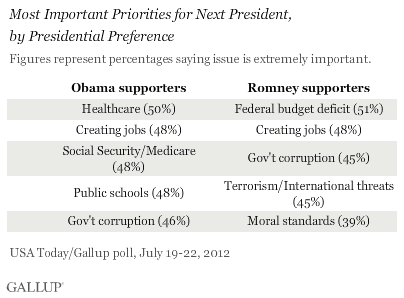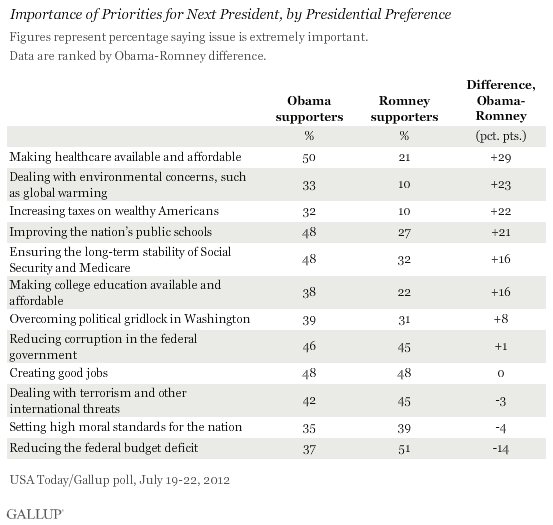PRINCETON, NJ -- Creating good jobs, reducing corruption in the federal government, and reducing the federal budget deficit score highest when Americans rate 12 issues as priorities for the next president to address. Americans assign much less importance to increasing taxes on wealthy Americans and dealing with environmental concerns.
![Next, how important a priority should each of the following issues be for the next president -- extremely important, very important, somewhat important, or not that important. How about -- [RANDOM ORDER]? July 2012 results](http://content.gallup.com/origin/gallupinc/GallupSpaces/Production/Cms/POLL/f43bj94grkwuh8v3yu6olq.gif)
The results are based on a July 19-22 USA Today/Gallup poll. Job creation's position at the top of the list is consistent with various measures of issue salience or importance Gallup has asked this year. Corruption in government usually ranks as an important issue when it is asked about specifically, though it is not as top-of-mind as jobs or the economy.
In addition to jobs, corruption, and the deficit, Americans also give relatively high priority to dealing with terrorism and other international threats, ensuring the long-term stability of Social Security and Medicare, and improving the nation's public schools.
Obama, Romney Supporters in Accord on Job Creation, Corruption
Supporters of Barack Obama and Mitt Romney likely disagree on how best to address the major issues facing the country, but they both rate job creation and reducing government corruption among their top priorities for the next president.
Romney supporters rate reducing the federal budget deficit as more important than Obama supporters do. In fact, slightly more Romney supporters say reducing the deficit is extremely important (51%) than say creating jobs is (48%).
Likewise, 50% of Obama supporters assign high importance to making healthcare available and affordable, two percentage points more than their rating of any other issue.

Obama and Romney supporters differ most on healthcare, dealing with environmental concerns, increasing taxes on the wealthy, and education. All of these are much higher priorities for Obama supporters than for Romney supporters. The deficit is the only issue that has a large party difference with Romney supporters saying it is more important.

Although there is a large difference in the relative importance of dealing with environmental concerns and increasing taxes on wealthy Americans, these issues are the lowest priorities for both Romney and Obama supporters.
In addition to job creation and corruption, there are relatively small differences in importance for terrorism and setting high moral standards.
Implications
Americans' to-do list for the president on Jan. 20, 2013 -- whether it be Obama or Romney -- includes creating good jobs, reducing government corruption, and reducing the federal budget deficit. Supporters of both candidates agree about the importance of jobs and corruption, while the deficit is a higher priority for Romney supporters than Obama supporters. In turn, Obama supporters believe the next president should have healthcare, Social Security and Medicare, and public education among his highest priorities.
Job creation has certainly been and will continue to be a major topic during the remainder of the campaign. And both candidates will surely need to outline their plans for reducing the federal budget deficit. However, it is unclear whether government corruption will become a major issue in the campaign, even though Americans see reducing it as an important goal.
The candidate who Americans think has the better plans on each of these issues will have an advantage. As of now, Americans believe Romney is better able to handle jobs and the deficit than Obama is. Still, the two candidates remain locked in a tight race, with voters' presidential preferences evenly divided.
Survey Methods
Results for this USA Today/Gallup poll are based on telephone interviews conducted July 19-22, 2012, with a random sample of 1,030 adults, aged 18 and older, living in all 50 U.S. states and the District of Columbia.
For results based on the total sample of national adults, one can say with 95% confidence that the maximum margin of sampling error is ±4 percentage points.
Interviews are conducted with respondents on landline telephones and cellular phones, with interviews conducted in Spanish for respondents who are primarily Spanish-speaking. Each sample includes a minimum quota of 400 cell phone respondents and 600 landline respondents per 1,000 national adults, with additional minimum quotas among landline respondents by region. Landline telephone numbers are chosen at random among listed telephone numbers. Cell phone numbers are selected using random-digit-dial methods. Landline respondents are chosen at random within each household on the basis of which member had the most recent birthday.
Samples are weighted by gender, age, race, Hispanic ethnicity, education, region, adults in the household, and phone status (cell phone only/landline only/both, cell phone mostly, and having an unlisted landline number). Demographic weighting targets are based on the March 2011 Current Population Survey figures for the aged 18 and older non-institutionalized population living in U.S. telephone households. All reported margins of sampling error include the computed design effects for weighting and sample design.
In addition to sampling error, question wording and practical difficulties in conducting surveys can introduce error or bias into the findings of public opinion polls.
View methodology, full question results, and trend data.
For more details on Gallup's polling methodology, visit www.gallup.com.
